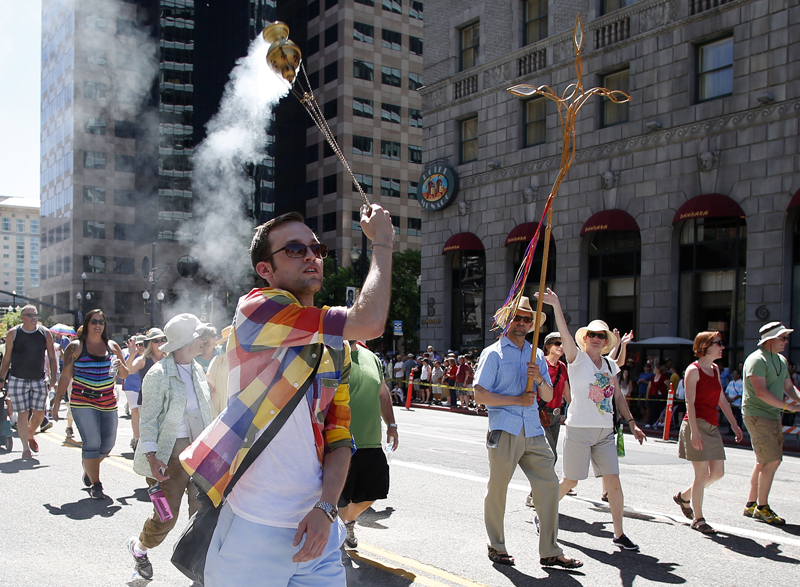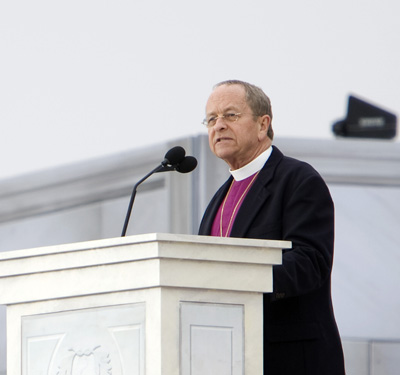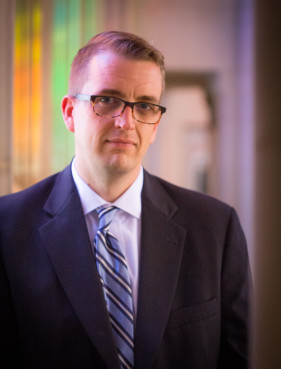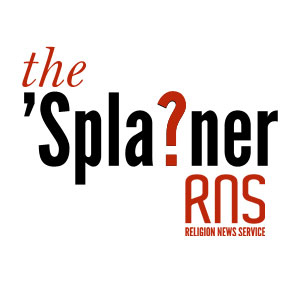
Charlie Knuth, front left, of the All Saints Episcopal Church swings a censer as he marches in a gay pride parade in Salt Lake City on June 2, 2013. Photo courtesy of REUTERS/Jim Urquhart
*Editors: This photo may only be republished with RNS-EPISCOPAL-SPLAINER, originally transmitted on July 2, 2015.
The ‘Splainer (as in “You’ve got some ‘splaining to do”) is an occasional online feature in which RNS staff give you everything you need to know about current events to hold your own at a cocktail party.
(RNS) On Wednesday (July 1), members of the Episcopal Church voted overwhelmingly to permit same-sex couples to wed in Episcopal churches, by Episcopal clergy using Episcopal liturgies. The move left many outside the church scratching their heads. The Episcopal Church in America has been a pioneer in inclusiveness for lesbians, gays, bisexuals, transgendered and queer people among traditional Protestant denominations. What does the vote actually mean? Let us ‘Splain . . .
Q: I thought the Episcopal Church had openly gay bishops, priests, members and married couples in its membership. How is it that the Supreme Court beat them to approving gay marriage?
A: True, the Episcopal Church, which represents about 2 million members, was among the first mainline Protestant denominations to openly affirm LGBT people as “children of God who have a full and equal claim with all other persons upon the love, acceptance, and pastoral concern and care of the church,” in 1976.
In 1994, the church proclaimed “God’s call is open to all” and allowed for the ordination of LGBT priests. The church marked another first in 2003 with the election of openly gay Gene Robinson to the post of bishop.

Episcopal Bishop V. Gene Robinson gave the invocation on Jan. 18, 2009, to begin the welcoming ceremony for Barack Obama’s presidential inauguration. Religion News Service photo by David Jolkovski
Then, in 2012, church representatives approved a “blessing” for same-sex unions. So same-sex Episcopalians could get married by a judge or ordained minister in another church, but an Episcopal priest could only “bless” the union.
For many in the church, this was not far enough — sort of a marriage consolation prize. They pushed for Episcopal priests to be able to perform same-sex marriages with a church-created and -approved liturgy. That was on the agenda at this year’s General Convention in Salt Lake City, and it passed.
Q: But I have been to same-sex weddings inside Episcopal Churches performed by Episcopal priests. Haven’t I? I swear, I didn’t start drinking until the reception.

- Kevin Eckstrom, spokesman for Washington National Cathedral, photographed inside the Cathedral on June 12, 2015. Religion News Service photo by Sally Morrow
A: Yes and no. Once states began legalizing civil same-sex marriages, many same-sex Episcopal couples were married in Episcopal churches with Episcopal priests officiating. But they could not use an Episcopal liturgy for the service. They borrowed from other denominations’ liturgies or wrote their own because no Episcopal same-sex marriage liturgy existed. They had to settle for the “blessing.” Now, that second-class status is gone and there will be an official Episcopal same-sex marriage liturgy. Kevin Eckstrom, spokesman for Washington National Cathedral, an Episcopal church, said it is hard to overstate how important a move this is to church members. “Liturgy is part of the Episcopal DNA, so that if something does not have its own liturgy it does not exist,” he said. “Liturgy defines Episcopal life together.”
Q: Does this mean all ordained Episcopal priests must perform same-sex marriages now?
A: No. Under these changes, clergy can decline to perform same-sex marriage without incurring a penalty or punishment, and bishops can refuse to allow same-sex marriages in their dioceses. So same-sex Episcopal couples seeking a church wedding could find themselves having to go somewhere other than their home church or even their home diocese. George Conger, writing for The Washington Post about the vote, described this as a compromise and said it means that “same-sex weddings may occur after Nov. 1, 2015, with the full blessing of the church in places like Washington, Los Angeles and New York, but likely won’t take place in more conservative parts of the church, like Dallas, Albany and Orlando.”
Q: So what changes will Episcopalians see?
A: The main change will be to the existing marriage liturgy. There will be new liturgies for same-sex marriages and language to the church’s laws regarding marriage will be more neutral — “man and woman” will become “couple.” And there may be an uptick in same-sex marriages performed inside Episcopal churches. Meanwhile, the controversy over religious same-sex marriages continues in the 80 million-member worldwide Anglican Communion, of which the Episcopal Church is a member.
YS/MG END WINSTON





